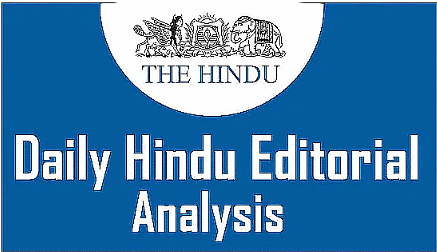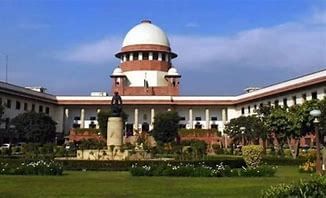The Hindu Editorial Analysis- 16th February 2024 | Current Affairs & Hindu Analysis: Daily, Weekly & Monthly - UPSC PDF Download

Unbonded
Why in News?
Anonymous donations of high value tend to undermine electoral democracy and governance as they facilitate a quid pro quo culture involving donors and beneficiaries. In striking down the Electoral Bond Scheme (EBS) under which anyone could buy electoral bonds and donate them to political parties for encashment, the Supreme Court of India has recognised this malaise and struck a blow for democracy and transparency in political funding.
What is the Electoral Bonds Scheme?
- Electoral bonds introduced as an alternative to cash donations for transparency in political funding.
- Opposition parties express concerns about alleged opaqueness in funding.
- Government of India notifies Electoral Bonds Scheme in January 2018.
- Bonds issued by State Bank of India (SBI) and purchasable with KYC-compliant accounts.
- First batch of bonds scheduled for sale from March 1-10, 2018.
- Buyers include Indian citizens or entities incorporated in India.
- Bonds are bearer banking instruments with no buyer name.
- Available in denominations of Rs 1,000, Rs 10,000, Rs 1,00,000, Rs 10,00,000, and Rs 1,00,00,000.
- SBI authorized to issue and encash bonds through select branches.
- Eligible political parties defined under Section 29A of the Representation of the People Act, 1951.
- Parties must secure at least 1% of votes in the last General Election to receive bonds.
- Bonds valid for 15 calendar days from issue date; no payments accepted after expiration.
Row over electoral bonds
- The central government introduced electoral bonds to ensure transparency in party donations while maintaining donor anonymity to prevent exposure of donor details.
- The scheme aims to track and limit the use of black money in election funding, providing an alternative to cash donations that could otherwise involve siphoning off funds.
- Experts argue that for true transparency, details of donations should not be withheld from the public.
- Neither the purchaser nor the receiving party is obligated to disclose donor identities, leading to corporate shareholders being unaware of contributions and voters lacking information on party funding sources.
- Critics warn that donor anonymity may encourage the influx of black money into political funding.
- Civil rights societies argue that donor anonymity undermines democratic principles.
- The Election Commission has expressed reservations about electoral bonds, citing concerns about transparency and accountability in political funding due to non-disclosure of contributions.
Conditions Of Electoral Bonds:
- Designated Banks: Electoral bonds are issued exclusively through banks authorized by the government for this purpose.
- Denominations: Electoral bonds are available in various denominations, spanning from small to large amounts.
- Validity Period: Each electoral bond has a specified validity period within which it must be utilized for political donations; any unused bonds expire after this period.
- Eligible Recipients: Only registered political parties are permitted to receive electoral bonds as donations.
- Encashment Period: Political parties are required to encash electoral bonds within a designated period after receiving them.
- Anonymous Donations: Donor identities remain anonymous in accordance with the provisions of the scheme.
- Transparency Requirements: Despite donor anonymity, political parties are obligated to disclose the total amount of electoral bonds received in their financial statements.
- Regulatory Oversight: The scheme is regulated by authorities such as the Reserve Bank of India and the Election Commission of India to ensure compliance with legal and regulatory standards.
- Prohibition on Cash Transactions: Electoral bonds aim to reduce cash transactions in political funding by directing contributions through banking channels.
- Disclosure Requirements: Political parties must provide details of electoral bonds received in their financial statements, including the total amount received and the denominations of bonds.
Procedure Of Electoral Bonds:
- Eligibility: Any citizen or organization incorporated in India is eligible to purchase electoral bonds.
- Designated Banks: Electoral bonds are issued through specific banks authorized by the government for this purpose.
- Application: Interested individuals or organizations approach designated bank branches to purchase electoral bonds.
- Documentation: Applicants may need to provide necessary documentation as per the bank’s requirements, including identity and address proof.
- Selection of Denomination: Purchasers choose the desired denomination(s) of electoral bonds they wish to buy.
- Payment: Payment for electoral bonds is made through electronic funds transfer or other permissible means specified by the bank.
- Issuance: Upon successful payment, the designated bank issues electoral bonds to the purchaser.
- Validity Period: Electoral bonds have a specified validity period within which the purchaser must use them for political donations.
- Donation: Purchasers can donate electoral bonds to registered political parties of their choice.
- Encashment: Political parties must encash electoral bonds within a prescribed period after receiving them.
- Anonymity: The donor's identity remains anonymous according to the scheme's provisions.
- Disclosure: Political parties disclose the total amount of electoral bonds received in their financial statements while keeping the donor's identity anonymous.
- Regulatory Oversight: Authorities like the Reserve Bank of India and the Election Commission of India regulate the entire process to ensure compliance with legal and regulatory requirements.
- Reporting: Political parties actively report details of electoral bonds received in their financial statements, including the total amount received and the denominations of bonds.
This procedure outlines the steps involved in the purchase, donation, and encashment of electoral bonds in India.
Advantages Of Electoral Bonds:
- Transparency: Electoral bonds aim to enhance transparency in political funding by routing contributions through banking channels rather than cash transactions.
- Reduced Cash Transactions: Utilizing electoral bonds helps decrease cash transactions in political funding, thus reducing the risk of black money and corruption.
- Regulatory Compliance: The scheme is regulated by the Reserve Bank of India and the Election Commission of India, ensuring adherence to legal and regulatory standards and bolstering the integrity of the electoral process.
- Increased Accountability: Political parties disclose the total amount of electoral bonds received in their financial statements while maintaining donor anonymity, enhancing accountability in political funding.
- Ease of Donation: Individuals and organizations find electoral bonds convenient and secure for donating to political parties, purchasing them from designated banks and transferring them to the recipient party effortlessly.
- Encouragement of Legitimate Funding: Electoral bonds establish a legal and transparent mechanism for political donations, promoting legitimate funding sources and reducing reliance on illicit financing.
- Promotion of Democratic Process: By providing financial support to parties across the spectrum, electoral bonds contribute to a more equitable electoral landscape, strengthening the democratic process.
- Incentive for Banking Transactions: Electoral bonds incentivize the use of banking channels for transactions, fostering financial inclusion and formalization of the economy.
- Flexibility in Contribution Amounts: Available in various denominations, electoral bonds allow donors to contribute according to their financial capacity and preferences, democratizing the political funding process.
Drawbacks Of Electoral Bonds:
- Anonymity of Donors: While anonymity may increase contributions, it raises concerns regarding transparency and accountability.
- Opacity in Funding Sources: Electoral bonds enable funding sources to remain undisclosed, potentially fostering opacity in political funding.
- Potential for Misuse: The anonymity of donors in electoral bonds poses a risk of misuse for money laundering purposes.
- Inequality in Political Influence: Electoral bonds may disproportionately favor wealthy donors, exacerbating political inequality.
- Lack of Level Playing Field: Opaque donations through electoral bonds could lead to election disparities, benefiting well-funded parties.
- Limited Accountability: Although parties disclose total bond amounts, the absence of donor information hampers accountability and conflict tracking.
- Bypassing Transparency Norms: Critics argue that electoral bonds undermine transparency norms by allowing donations to go undisclosed.
- Potential for Corporate Influence: Electoral bonds may facilitate corporate influence on politics, potentially undermining democratic integrity.
- Lack of Public Confidence: The lack of transparency and accountability in electoral bonds undermines public confidence in democratic processes.
- Legal Challenges: Electoral bonds face legal challenges concerning their constitutionality and transparency in political funding.
Way Forward:
- Enhanced Transparency Measures: Implement measures to increase transparency, such as disclosing donor identities to the Election Commission or making donor information public.
- Stricter Regulatory Oversight: Strengthen regulatory oversight of electoral bonds to ensure transparency and accountability in political funding.
- Public Disclosure Requirements: Enforce requirements for political parties to publicly disclose all donations, including donor identities and amounts, promoting transparency.
- Limits on Corporate Donations: Introduce limits on corporate donations through electoral bonds to promote fairness in political funding.
- Educational Campaigns: Conduct public awareness campaigns on the electoral bond scheme to promote transparent and accountable political funding.
- Regular Review and Evaluation: Periodically review the electoral bond scheme to assess transparency, accountability, and fairness, making adjustments as necessary.
- Engagement with Stakeholders: Solicit feedback from stakeholders to improve the electoral bond system and address concerns.
- Exploring Alternatives: Explore alternative funding methods such as public funding or stricter campaign finance rules to balance transparency, accountability, and donor privacy.
- Legal Reforms: Implement legislative reforms to address legal and constitutional concerns with the electoral bond scheme, ensuring alignment with democratic principles.
- International Best Practices: Learn from global best practices to strengthen the electoral bond system through informed reforms.
Conclusion:
In conclusion, They serve as a mechanism to promote transparent political funding by reducing cash usage and enhancing accountability. Despite some controversy and debate, they aim to provide a structured framework for donations to political parties in India, contributing to the integrity of the electoral process.
|
63 videos|5408 docs|1146 tests
|

















